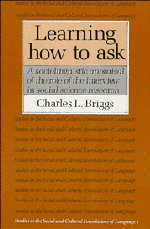 Learning How to Ask
Learning How to Ask Published online by Cambridge University Press: 05 June 2012
The preceding pages have hardly eschewed theoretical issues. Thus far, however, theory has been used primarily as a means of highlighting the problems inherent in interview techniques, exploring their theoretical roots, and pointing the way to methodological progress. Such discussion is not, in and of itself, sufficient to show that the adoption of a critical perspective on interviewing is requisite to theoretical advances in the social sciences and linguistics. But the lack of a critical perspective on interview techniques is tied to a number of fundamental theoretical obstacles.
My thesis is that methodological shortcomings have both emerged from and in turn reinforced these theoretical quagmires. The problem is that the goals of social-scientific and linguistic research lie beyond the confines of this highly circumscribed process. The only way to break this pattern is to raise methodological questions from the inferior status they currently enjoy, explore the interpenetrations of theoretical and methodological problems, and revise methodology in the light of theory and vice versa.
A number of important theoretical advances have been made in the last two decades. Scholars from diverse disciplinary and theoretical perspectives have moved away from an emphasis on static structures and codes as abstracted from human conduct. Research has focused increasingly on the way codes relate to messages, or structure to action, and the manner in which the system is transformed through use. Social–cultural anthropology, for example, has moved away from viewing culture as monolithic and static toward analyzing the way in which cultural systems are instantiated in individual events by concrete persons (cf. Crick 1976; Geertz 1973).
To save this book to your Kindle, first ensure [email protected] is added to your Approved Personal Document E-mail List under your Personal Document Settings on the Manage Your Content and Devices page of your Amazon account. Then enter the ‘name’ part of your Kindle email address below. Find out more about saving to your Kindle.
Note you can select to save to either the @free.kindle.com or @kindle.com variations. ‘@free.kindle.com’ emails are free but can only be saved to your device when it is connected to wi-fi. ‘@kindle.com’ emails can be delivered even when you are not connected to wi-fi, but note that service fees apply.
Find out more about the Kindle Personal Document Service.
To save content items to your account, please confirm that you agree to abide by our usage policies. If this is the first time you use this feature, you will be asked to authorise Cambridge Core to connect with your account. Find out more about saving content to Dropbox.
To save content items to your account, please confirm that you agree to abide by our usage policies. If this is the first time you use this feature, you will be asked to authorise Cambridge Core to connect with your account. Find out more about saving content to Google Drive.